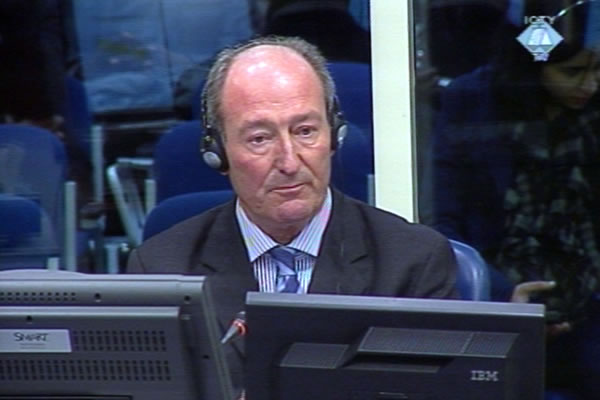Home
‘PSYCHOPATHS AND BULLIES’ COMMITTED CRIMES
At the trial of Radovan Karadzic, the former president of the Foca Executive Board denied that the Crisis Staff had anything to do with the crimes in the municipality. According to the witness, ‘psychopaths and bullies’ who could not be controlled were responsible for the crimes
 Radojica Mladjenovic, defence witness of Radovan Karadzic
Radojica Mladjenovic, defence witness of Radovan Karadzic In his statement to Karadzic’s defense team, Radojica Mladjenovic, former president of the Executive Board of Foca municipality, contends that the Crisis Staff never ‘ordered or abetted’ any abuse, looting, murder or intimidation. Mladjenovic didn’t deny that there were ‘certain restrictions to the movement of the Muslim population’ imposed ‘for their safety’.
Mladjenovic claims that only those that ‘violated military rules’ were brought to the Foca Penitentiary and Correctional Facility (KPD), denying that anybody from the Serb military or political leadership ordered crimes. On the contrary, the units were ordered to respect international conventions. The KPD Foca facility was initially set up as a prison for civilians. Then it became a military prison; the Crisis Staff supplied food and “anything else possible” for the prisoners in consultation with the army and the International Red Cross. The indictment alleges that about 200 prisoners were killed in the KPD Foca from June to December 1992.
In his statement, the witness says that the military and civilian authorities complained about the presence of paramilitary units that were impossible to identify. As ‘chaos’ reigned it was difficult to prevent the destruction and looting of property although the army and the police tried to intervene and did their job ‘seriously and professionally’.
At the beginning of the cross-examination, prosecutor Bronagh McKenna put it to the witness that the Serb municipality of Foca was formed in late December 1991 on Karadzic’s instructions. Mladjenovic replied that ‘Mr. Karadzic absolutely did not order it’. The witness went on to explain that the Serb municipal authorities were formed ‘as precaution, as a backup option’ because ‘everything indicated there would be a bad situation and hostile relations’. As an example, Mladjenovic spoke about a leaflet purportedly distributed at a Party of Democratic Action rally. The leaflet encouraged Muslims to ‘make nightly phone calls to Serb neighbors’ and to ‘incite their big dogs to attack small Serb dogs’ in the parks. Mladjenovic stood by his claim even when an audio recording of his speech at a meeting in the Holiday Inn Hotel was played to him. On 14 February 1992, Mladjenovic said that the Serb authorities in Foca were established in line with the instructions from the ‘headquarters’.
The prosecutor also showed an excerpt from an interview given by the information minister Velibor Ostojic to the BBC. In the interview, Ostojic confirmed that the Crisis Staff was in charge of Foca and that his task was to establish the civilian authorities. The witness replied that Ostojic ‘happened to be in the area because his mother lived there’. However, at one point Ostojic realized that he was a ‘third wheel and hindrance’ because he ‘was too much of a philosopher’, and he let the Crisis Staff do what it had set out to do, Mladjenovic explained. ‘Things were not looking up’ in the civilian authorities, the witness said. Subsequently, the army, although it was ‘more or less disorganized’, started to ‘operate more regularly’ in that area, Mladjenovic said.
The prosecutor asked Mladjenovic if he knew that Dragoljub Kunarac and his men had raped Muslim women in Foca. Mladjenovic said that he knew about it, adding that it ‘disturbed humanity and added to the perpetual hate and to the contempt for what they did’. Then Mladjenovic apologized to ‘the victims who were treated that way’. The prosecutor went on to tell Mladjenovic that Dragan Gagovic, the police chief who was also in the Crisis Staff had raped women too, although he was supposed to protect them. Mladjenovic said he refused to believe that. Gagovic was ‘a person committed to protecting the elderly, women and girls’ who were still in the Foca area. The crimes were committed by ‘psychopaths and bullies’, he claimed; it was difficult to prevent them.
Mladjenovic claimed that the perpetrators of the crime were detained and punished. To counter the claim, the prosecutor showed a document which indicates that local commanders Pero Elez, Gojko Jankovic and Brane Cosovic were ‘commended for the achievements in the effort to liberate Foca’ and that Karadzic kept Radovan Stankovic in the VRS. The witness replied that Karadzic acted ‘on the instructions’ he received from ‘someone’ in Foca.
Milorad Skoko, the wartime director of the Republika Srpska power company Elektroprivreda, began his testimony at the end of the hearing today. In his statement to the defense team Skoko said that during the war Sarajevo received 550m kWh of electricity from the Serb side. That, Skoko explained, was sufficient for ‘basic household needs’. Had all the power been distributed to the citizens, each household in the city would have had just a little less electricity than the average household in ‘Serbia and other poor countries’. Skoko will continue his evidence on Monday.
Linked Reports
- Case : Karadzic
- 2013-04-04 PERFECT HARMONY AT KARADZIC TRIAL
- 2013-04-04 ORIC WILL NOT ‘DEFEND’ KARADZIC
- 2013-04-03 LJUBISA BEARA REFUSES TO OBEY SUPREME COMMANDER
- 2013-04-08 AIRBRUSHING SARAJEVO REALITY
- 2013-04-09 DODIK BLAMES IZETBEGOVIC, HIGH REPRESENTATIVE AND OTP
- 2013-04-10 RELIGION DETERMINED MENU IN KULA PRISON RESTAURANT
